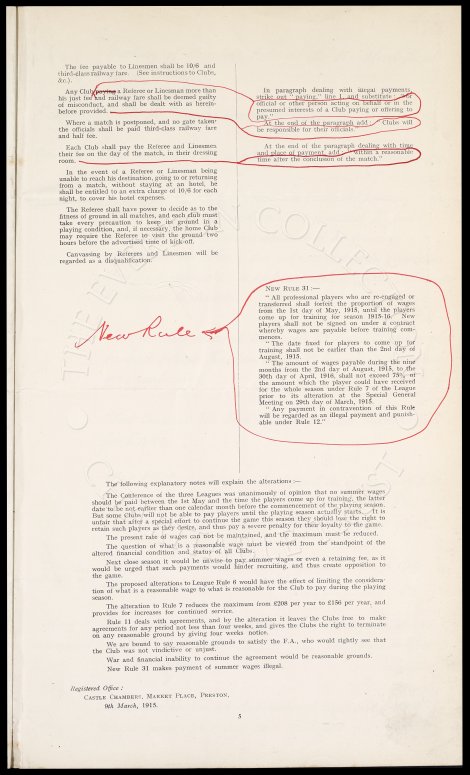The fee payable to Linesmen shall be 10/6 and
third-class railway fare. (See instructions to Clubs,
&c.).
Any Club paying a Referee or Linesman more than In paragraph dealing with illegal payments,
his just fee and railway fare shall be deemed guilty strike out "paying," line 1, and substitute: "or
of misconduct, and shall be dealt with as herein- official or other person acting on behalf or in the
before provided. presumed interests of a Club paying or offering to
pay."
Where a match is postponed, and no gate taken' At the end of the paragraph add: "Clubs will
the officials shall be paid third-class railway fare be responsible for their officials."
and half fee.
Each Club shall pay the Referee and Linesmen At the end of the paragraph dealing with time
their fee on the day of the match, in their dressing and place of payment, add: "within a reasonable
room. time after the conclusion of the match."
In the event of a Referee or Linesman being
unable to reach his destination, going to or returning
from a match, without staying at an hotel, he
shall be entitled to an extra charge of 10/6 for each
night, to cover his hotel expenses.
The Referee shall have power to decide as to the
fitness of ground in all matches, and each club must
take every precaution to keep its ground in a
playing condition, and, if necessary, the home Club
may require the Referee to visit the ground two
hours before the advertised time of kick-off.
Canvassing by Referees and Linesmen will be
regarded as a disqualification.
NEW RULE 31 :—
"All professional players who are re-engaged or
transferred shall forfeit the proportion of wages
from the 1st day of May, 1915, until the players
come up for training for season 1915-16. New
New Rule players shall not be signed on under a contract
whereby wages are payable before training com-
mences.
"The date fixed for players to come up for
training shall not be earlier than the 2nd day of
August, 1915.
"The amount of wages payable during the nine
months from the 2nd day of August, 1915, to the
30th day of April, 1916, shall not exceed 75% of
the amount which the player could have received
for the whole season under Rule 7 of the League
prior to its alteration at the Special General
Meeting on 29th day of March, 1915.
"Any payment in contravention of this Rule
will be regarded as an illegal payment and punish-
able under Rule 12."
The following explanatory notes will explain the alterations:—
The Conference of the three Leagues was unanimously of opinion that no summer wages
should be paid between the 1st May and the time the players come up for training, the latter
date to be not earlier than one calendar month before the commencement of the playing season.
But some Clubs will not be able to pay players until the playing season actually starts. It is
unfair that after a special effort to continue the game this season they should lose the right to
retain such players as they desire, and thus pay a severe penalty for their loyalty to the game.
The present rate of wages can not be maintained, and the maximum must be reduced.
The question of what is reasonable wage must be viewed from the standpoint of the
altered financial condition and status of all Clubs.
Next close season it would be unwise to pay summer wages or even a retaining fee, as it
would be urged that such payments would hinder recruiting, and thus create opposition to
the game.
The proposed alterations to League Rule 6 would have the effect of limiting the considera-
tion of what is a reasonable wage to what is reasonable for the Club to pay during the playing
season.
The alteration to Rule 7 reduces the maximum from £208 per year to £156 per year, and
provides for increases for continued service.
Rule 11 deals with agreements, and by the alteration it leaves the Clubs free to make
agreements for any period not less than four weeks, and gives the Clubs the right to terminate
on any reasonable ground by giving four weeks notice.
We are bound to say reasonable grounds to satisfy the F. A., who would rightly see that
the Club was not vindictive or unjust.
War and financial inability to continue the agreement would be reasonable grounds.
New Rule 31 makes payment of summer wages illegal.
Registered Office :
CASTLE CHAMBERS, MARKET PLACE, PRESTON,
9th March, 1915.
5

